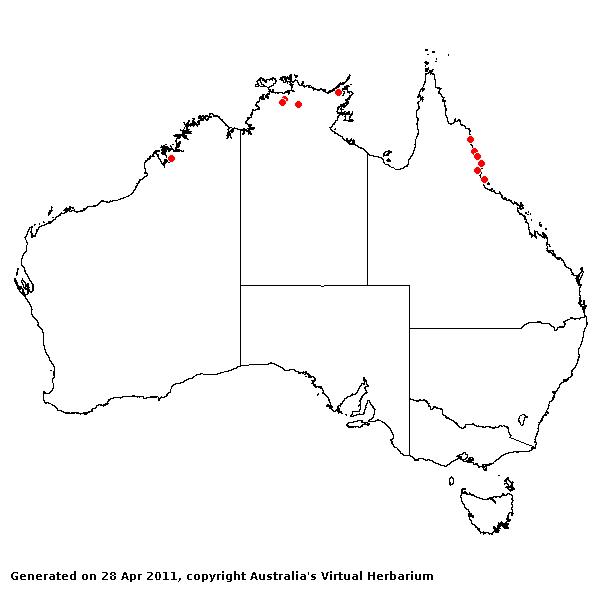Isachne minutula* (Gaudich.) Kunth. Rév.
Gram. 2: 407 (1831), Suppl. (1834).
Classification.
(GPWG 2001) : Subfamily Micrairoideae. Isachneae.
Basionym and/or
Replacement Name: Panicum
minutulum Gaudich., Voy. Monde 410 (1829).
Type of Basionym or
Protologue Information: India:, Heyne s.n. (HT: B).
Recent synonyms:
I. miliacea, I. brassii.
Key references (books
and floras): [1878] G.Bentham, Flora Australiensis 7 (625 as ?
Isachne myosotis), [2002] D.Sharp & B.K.Simon, AusGrass, Grasses of
Australia (as I. pulchella).
Habit. Annual.
Culms prostrate, stature slender to delicate, 3–35 cm tall. Mid-culm nodes bearded.
Lateral branches sparsely branched. Leaf-sheaths glabrous on surface or hairy.
Ligule a fringe of hairs, 0.8–1.2 mm long. Leaf-blades elliptic, 1–5 cm long,
2–10 mm wide. Leaf-blade surface indumented.
Inflorescence.
Inflorescence compound, a panicle. Panicle elliptic or oblong, 2–12 cm long,
0.5–3 cm wide.
Spikelets.
Spikelets pedicelled. Fertile spikelets 2-flowered, the lower floret barren
(rarely male), the upper fertile, comprising 1 fertile floret(s), without
rachilla extension, elliptic, dorsally compressed, 1–1.6 mm long.
Glumes.
Glumes similar, thinner than fertile lemma. Lower glume elliptic, herbaceous,
without keels, 5–7 -nerved. Lower glume surface glabrous. Upper glume elliptic,
1.1–1.5 mm long, herbaceous, without keels, 5–7 -nerved. Florets. Basal
sterile florets 1, male, with palea. Lemma of lower sterile floret chartaceous,
3–5 -nerved.
Fertile lemma 1–1.3 mm
long, without keel. Lemma surface indumented. Palea 2 -nerved. Lodicules
present. Anthers 3.
Continental
Distribution: Tropical Asia and Australasia.
Australian
Distribution: Western Australia, Northern Territory, Queensland.
Western Australia:
Fitzgerald. Northern Territory: Darwin & Gulf. Queensland:
Cook, North Kennedy.
Notes.
Introduced. Native to tropical Asia and apparently introduced in Australia. In
tropical and subtropical rain forests, tropical and subtropical sub-humid
woodlands, and coastal grasslands. Occurs in damp shaded forests and swampy
areas. Flowers Mar.-July.

